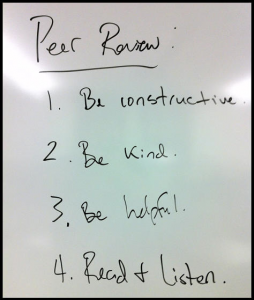Peer review is most helpful to writers when reviewers go beyond pointing to problems or correcting errors, and instead assess the writer’s arguments and use of sources. Robust comments that point at and diagnose global concerns, while offering concrete and specific suggestions can help writers significantly improve their papers. The best reviewers will go beyond assessment and engage the writer’s ideas and source use, extending or challenging the writer’s own views or interpretations of his or her sources. Excellent reviews help writers see their work in a new light.
Use this rubric to assess the quality of your feedback to your peers.
Novice Level Performance
- Comments POINT at areas for improvement, but may not DIAGNOSE problems, or may diagnose them inaccurately. Few SUGGESTIONS are made to improve the problem, or suggestions made are not supportive.
- Comments may focus on LOCAL concerns (such as grammar and spelling), or sentence-level concerns too early in the process.
- Comments may be only a few words or a single sentence long.
- Comments may not engage the writer’s ideas or source use, or engagement may not be helpful.
- Comments may be generic, overly general, or formulaic.
- The writer may be unable to understand the reviewers’ comments or use them to plan revision.
- End comments may be thin or missing.
Apprentice Level Performance
- Comments POINT at and DIAGNOSE areas for improvement. Diagnoses are often accurate and helpful. Sometimes SUGGESTIONS for improvement are made, and may be more or less helpful, but suggestions are supportive.
- Comments mostly focus on GLOBAL concerns EARLY in the writing process; LOCAL concerns are commented on LATER in the writing process.
- Most comments are multiple sentences long.
- Comments helpfully summarize and paraphrase the writer’s ideas and evaluate the writer’s source use, sometimes helping the writer see how to extend his or her ideas or improve his or her source use.
- Comments occasionally suggest bits of language, ideas, or passages for the writer to incorporate into his or her paper.
- The writer can understand the reviewer’s suggestions for improvements and use them to plan revision.
- End comments help the writer understand the overall strengths and weaknesses of the paper.
Advanced Level Performance
- Comments POINT at and DIAGNOSE areas for improvement. SUGGESTIONS for improvement tend to be helpful and supportive.
- Comments focus on the MOST IMPORTANT GLOBAL concerns EARLY in the writing process and help the writer prioritize improvements.
- STIGMATIZING LOCAL CONCERNS are noted LATER in the writing process.
- Most comments are four or more sentences long.
- Comments EXTEND or CHALLENGE the writer’s ideas or source use.
- Comments frequently suggest bits of language, ideas, or passages for the writer to incorporate into his or her paper, or suggest text-to-text, text-to-self, or text-to-world connections.
- The writer can understand the reviewer’s suggestions for improvements and use them to plan revision. The reviewer’s suggestions SHED NEW LIGHT on the writer’s argument.
- End comments help the writer understand the overall strengths and weaknesses of the paper, and contribute significantly to the writer’s revision plan.
![SASC - Student Academic Success Center - UNE [logo]](https://s3.amazonaws.com/files.uneportfolio.org/wp-content/uploads/sites/5/2022/02/SASCLogoSquare_Smaller-3-e1644936452801.jpeg)
